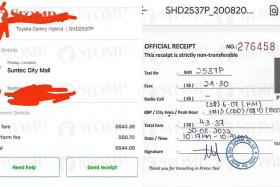NEA launches $1.76m fund to help minimise food waste
Food Waste Fund, which will cover cost of treatment systems, open to firms, non-profit organisations
The National Environment Agency (NEA) has committed $1.76 million to a new fund that will help alleviate the problem of food wastage.
The agency yesterday announced the Food Waste Fund, which will cover the cost of implementing food waste treatment solutions for businesses.
The fund will be open to companies, non-profit organisations (NGOs) and bodies such as management corporation strata titles. Applications will be from May 18 this year to Feb 28 next year.
NEA said the fund is in line with "efforts to secure Singapore's climate resilient future and help companies transition towards a zero waste economy amid the current challenging economic conditions".
The fund, capped at $100,000 for each applicant, covers the capital cost of food waste treatment systems, accompanying equipment such as bin lifters, and infrastructural improvements.
It will be disbursed in two stages, with the first 50 per cent of the approved grant disbursed upon installation and commissioning of the food waste treatment system.
For example, the fund will offset the cost of acquiring recycling equipment to convert food waste into other products such as animal feed.
Industry groups, including the Singapore Food Manufacturers' Association, Singapore Hotel Association and Singapore Manufacturing Federation, said the grant will benefit companies that are keen to integrate food waste management practices into their businesses.
They also said the fund's shorter disbursement period was attractive since applicants will be able to claim the full grant in six months.
Food wastage continues to be an issue even as the amount of such waste disposed of last year was one of the lowest in recent years, following a downward trend and with food waste recycling on the rise.
Yet food waste still accounts for about 10 per cent of all waste generated in Singapore, while the food recycling rate still remains relatively low, at 18 per cent last year.
NEA said the preferred way to manage food waste is to minimise wastage at the outset.
From 2024, owners and operators of commercial and industrial premises where large amounts of food waste are generated, such as large hotels and malls, will be required to segregate their food waste for treatment.
NEA said the fund also aims to help companies adopt food waste segregation and treatment ahead of the mandatory requirement.
For more information, go to www.nea.gov.sg/food-waste-fund
Get The New Paper on your phone with the free TNP app. Download from the Apple App Store or Google Play Store now


